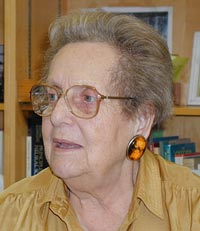Berkeleyan
Obituary
Paola Timiras
![]()
24 September 2008
 Robert Sanders photo |
In 2001, at age 78, Paola Timiras rounded up colleagues to found and co-direct the Center for Research and Education on Aging (CREA) on the Berkeley campus.
At 79, the professor emerita of molecular and cell biology spearheaded an annual health fair to promote healthy aging, and enrolled in a strength-training class to practice what she preached.
At 80 she agreed to write a book, in French, on stress and longevity, published in 2004; and in her mid-80s she was still active in the laboratory, supervising graduate students and more than a dozen undergraduates while trying to raise money to establish a center for aging research.
Vigorous to the end, Timiras worked a full day on Friday, Sept. 12. That night, she died unexpectedly of heart failure at Summit Medical Center in Oakland. She was 85.
“She was one of the foremost physiologists of aging,” said colleague Judith Campisi, a senior scientist at Lawrence Berkeley National Laboratory and co-director of CREA. “In an era of specialization, Paola took a holistic approach to aging, [looking at] how it affects the whole organism. People loved her; she is going to be sorely missed.”
Author or editor of 15 books and more than 400 articles in Italian, French, and English, her lasting legacy is the massive book she edited, Physiological Basis of Aging and Geriatrics, now in its fourth edition. Timiras also wrote and edited books on human growth and development, the role of hormones in aging, and the role of stress in aging.
“Her most important contributions in geriatrics and gerontology had to do with leadership in the field, her amazing textbooks, and her spirit,” said George Brooks, an exercise physiologist and Berkeley professor of integrative biology. “She was a wonderful colleague, and students revered her.”
During her 53 years at Berkeley, Timiras chaired the Department of Physiology and Anatomy from 1978 until 1984. She loved teaching, and since 1985 regularly taught a course, Multidisciplinary Advances in Aging, that brought students together with senior citizens in nursing homes. She continued to teach and conduct research after her formal retirement in 1994.
Timiras once told a reporter, “You can work diligently all your life, and you might not change the course of things. But if you like to teach, whatever else you do takes on more meaning.”
Pursuing a childhood dream
Paola Silvestri Timiras was born in Rome in 1923, just before the rise of the Fascists under Benito Mussolini. Her father, a statistician and outspoken anti-fascist, was forced to flee to France in 1924, leaving Timiras and her mother behind, although they made extended visits to France. From childhood she dreamed of becoming a physician like her grandfather and uncle. After graduating from the University of Grenoble in France — and repeating her degree at the University of Rome La Sapienza when her foreign diploma proved unacceptable — she was finally admitted to the University of Rome’s medical school in 1941.
After graduating summa cum laude in 1947, she and her new husband, Nicholas Timiras, a Romanian diplomat, relocated to Montreal, Canada, when it became apparent that her husband would be arrested if he returned to Communist Romania. There she enrolled in the University of Montreal to study experimental medicine and surgery, abandoning bedside medicine to concentrate on research. She earned her Ph.D. in 1952 with a thesis on how stress influences the immune system through the effects of adrenocortical hormones, and was immediately hired as an assistant professor.
In 1954 she and her husband moved again, this time to the United States, where Paola Timiras took a position in the Department of Pharmacology at the University of Utah Medical School. In 1955 she joined the Berkeley physiology department as an assistant physiologist and was appointed to the faculty in 1958. She became a full professor in 1967.
Throughout her career she continued to study how hormones influence the brain, in particular how sex hormones — estrogen and testosterone — affect brain development, Campisi said. In recent years, Timiras’ group has been probing whether estrogen protects nerve cells against age-related changes that cause memory loss.
Tireless in educating students and the public about the effects of aging, she always set aside three lectures in her human-physiology class to discuss aging and to emphasize that aging is merely a continuation of the process of post-natal growth and development. In the 1960s she created a class on the physiology of aging that she said was one of the first in the country.
Among her awards were the 1985 Gold Medal for Research of the American Aging Association; the 1987 Andrés Bello Decoration from Venezuela for contributing to international biomedical advancement; a 1984 Silver Award from the University of Chieti Medical School, Italy; and medals from the University of Paris and the University of Pau, both in France, and the University of Pisa in Italy.
She was one of the founders, and the president from 1978 to 1981, of the International Society of Developmental Neuroscience, vice president and president of the International Society of Psychoneuroendocrinology from 1974 to 1982, and president in 1970 of Iota Sigma Pi, the Association of Women Chemists.
Timiras is survived by her daughter, Mary Letitia Timiras, of New Jersey, and her son, Paul Timiras, of California. Her husband, Nicholas Timiras, died in 1996.
A funeral service was held on Saturday, Sept. 20. Donations in Timiras’ memory may be sent to the Jewish Home and Senior Living Foundation, for the benefit of the Research Department, 302 Silver Ave., San Francisco, CA 94112.

